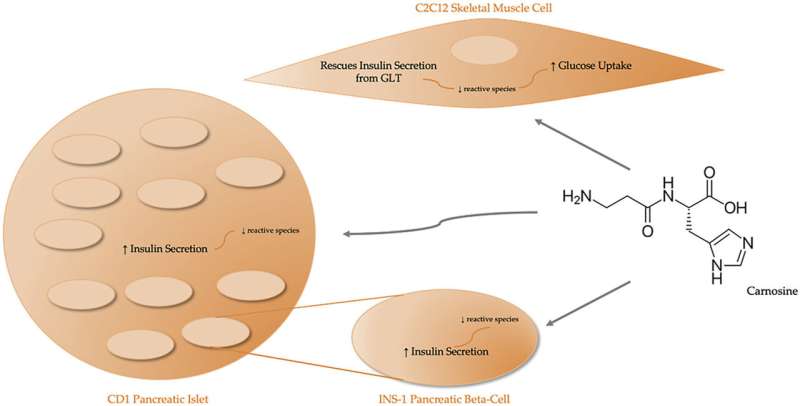

A large proportion of the damaging chemical changes which occur in the body’s cells due to diabetes and obesity could be prevented by a naturally occurring molecule, a new study suggests.
In type 2 diabetes, when glucose stays in the blood it is not used as fuel for energy and can instead lead to toxic molecules forming.
Scientists at Nottingham Trent University investigated how this “metabolic stress,” resulting from prolonged exposure to high levels of glucose and fat, damages proteins in the blood and cells and prevents them from working properly.
The researchers, writing in the journal Free Radical Biology and Medicine, also studied the effect of “carnosine,” a molecule found in human skeletal tissue and consumed in the diet through meat and fish. It can also be taken as a nutritional supplement.
While further studies are required, it could pave the way for the potential development of new classes of drugs related to carnosine that would be able to help tackle this previously untreated aspect of type 2 diabetes.
The study involved using mass spectrometry—the process of weighing and separating molecules—to identify proteins in patient blood samples damaged by raised levels of glucose and fatty acids.
By comparing with the blood of healthy individuals, the team was able to identify disease-associated changes in patients with obesity, type 2 diabetes and gestational diabetes.
Further laboratory work then investigated the extent to which carnosine was able to prevent similar damaging protein modifications in cells and tissues linked to the control of glucose.
The researchers found that carnosine prevented 65–90% of these damaging chemical changes and protected the functional properties of affected cells.
The researchers say that despite the cells being compromised, carnosine was able to preserve cellular function by soaking up the toxic molecules.
The team has previously shown the potential of carnosine in controlling blood sugar levels, but now understand exactly which proteins are damaged.
“The regulation of blood glucose is vital for the human body to ensure that the energy requirements of vital organs are met,” said Dr. Mark Turner, a senior researcher in Nottingham Trent University’s School of Science and Technology.
He said: “In patients with type 2 diabetes certain molecules become less effective and so can’t do their job properly when it comes to regulating glucose in the body. After identifying these molecules in patient groups, we wanted to see the role that carnosine could play in preventing these damaging changes.
“We found that carnosine is able to protect cells that are responsible for controlling blood sugar levels. This increases sensitivity to glucose and also results in greater insulin release.
“While further studies are required, this work has confirmed our hypothesis that carnosine could offer significant therapeutic potential against type 2 diabetes.”
Type 2 diabetes—often linked to being overweight, inactivity and family history—is a lifelong condition which causes the level of sugar, or glucose, in the blood to become too high.
It occurs when the pancreas does not release enough insulin, or the cells of the body do not react to insulin.
Source: Read Full Article